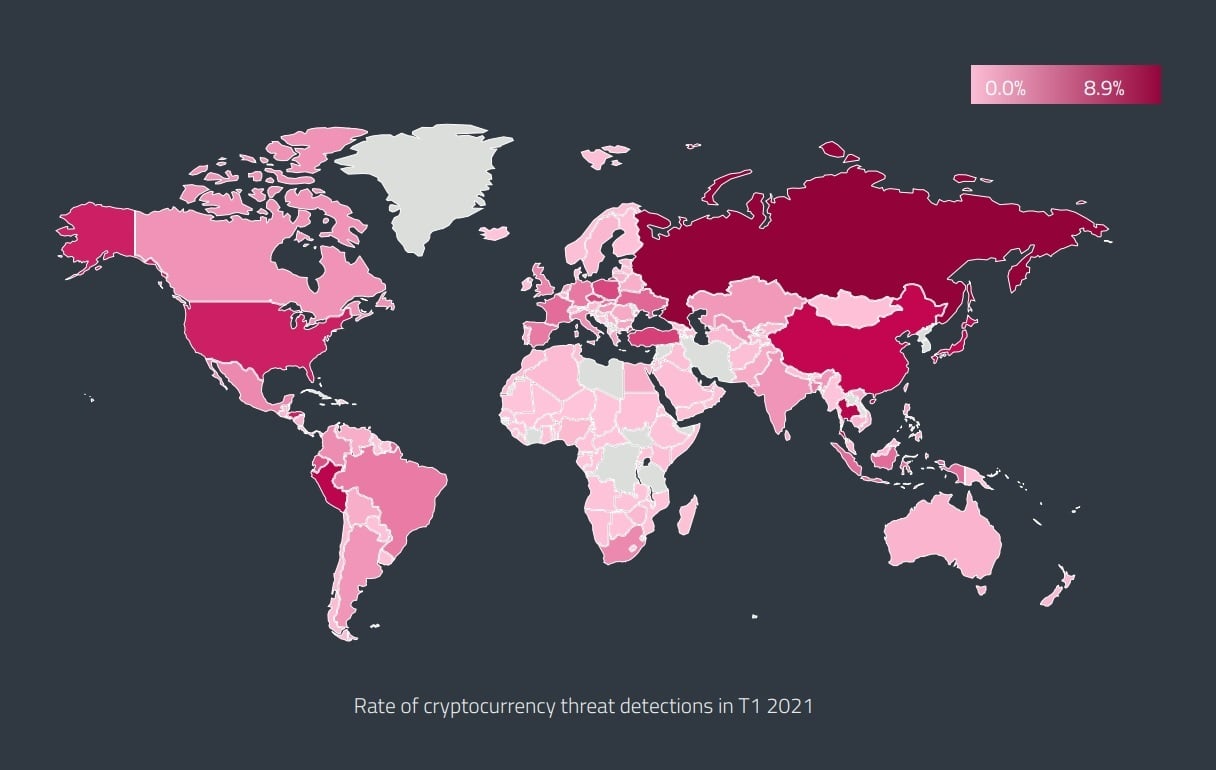
Cyberthreats related to cryptocurrencies have increased with rising demand for the digital assets, a study has concluded. Russia, Thailand and Peru are the most affected countries by malicious attacks designed to exploit the heightened interest in decentralized money, the authors point out.
Booming Crypto Markets Bring Out Cybercriminals
Despite the ongoing Covid pandemic still leading the headlines around the world, the topic has lost some prominence in the cyberthreat landscape since the beginning of this year. At the same time, threats related to cryptocurrencies have increased alongside rising crypto prices over the past few months, shows a recent report by ESET.
Mainstream acceptance, including by celebrities and executives like famous American rapper Snoop Dogg and Tesla CEO Elon Musk, has also contributed to the growing appeal of crypto assets. “Booming cryptocurrencies bring out cybercriminals,” the company emphasized in the study, released earlier this month and quoted by RT on Monday.

Crypto-related threats started to grow in the second half of 2020 and continued to increase in the first four months of 2021. This particular malware category expanded by 18.6%, with two spikes related to cryptocurrency miners in February and April. Noting that major cryptocurrencies like bitcoin (BTC) and ethereum (ETH) have reached their all-time highs during the period, researchers commented:
The upward trend comes as no surprise, since recent months have seen cryptocurrencies dramatically increase in value, becoming much more tempting for cybercriminals.
The Russian Federation is the country that has suffered the most from cyber threats related to cryptocurrencies this year, accounting for 8.9% of all attacks. G7 leaders recently called on the government in Moscow to identify those who abuse cryptocurrency in ransomware attacks, as Bitcoin.com News reported. Russia is followed closely by Thailand, with 5.6% of the detections, and Peru comes in third with 5.3%.
Miners Drive Growth in Crypto-related Cyberthreats
Cryptocurrency mining software has been the driving force behind the growth of cryptocurrency threats, ESET said. According to the cybersecurity firm, this type of malware, including cryptojacking attacks, increased this year by 22% compared to the last four months of 2020.
Meanwhile, the share of crypto stealers dropped by 28%. Malicious software in this category often targets the biggest, most established cryptocurrencies such as bitcoin (BTC) and ethereum (ETH), the mining of which is not as profitable anymore. ESET has registered a significant increase in attacks involving ETH. Cybercriminals spreading mining software usually target smaller coins that have only recently become popular.
According to Igor Kabina, ESET Senior Detection Engineer, crypto-related criminality in the cyber space remains closely tied to ransomware as well. The increasing value of cryptocurrency, which the expert says is the go-to means of payment in such attacks, motivates perpetrators to create more ransomware. “This is because the relative anonymity offered by the cryptocurrency trading market enables threat actors to increase their profits without taking unnecessary risks,” the cybersecurity expert elaborated.
Have you been targeted in cyberattacks related to cryptocurrencies? Let us know in the comments section below.